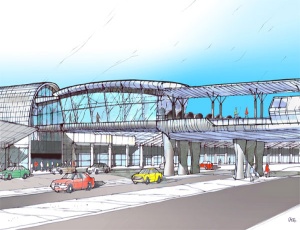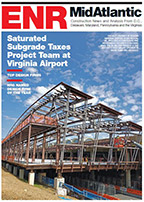The BART Board of Directors recently gave the go-ahead for a train-to-plane connection project between the Coliseum BART Station and the Oakland Airport.

The board also voted seven to one to award Flatiron/Parsons Joint Venture the contract to design and build the 3.2-mi automated people mover. The board also voted seven to one to award Doppelmayr Cable Car Inc. the contract to operate and maintain the connector once built.
“Oakland International congratulates BART and the many other agencies involved in awarding contracts for construction of the long-awaited Oakland Airport Connector,” says Deborah Ale Flint, OAK’s acting director of aviation, which is owned and operated by the Port of Oakland. “By the end of 2013, travelers will enjoy a more seamless, comfortable, environmentally friendly, and faster connection between the airport and BART’s Coliseum/Oakland Airport Station. Additionally, the connector will bring improved air service and economic benefits to the airport and the East Bay Area.”
BART’s Oakland Airport Connector will replace the current AirBART bus service, and will offer predictable connections and certainty in travel time; Automated People Movers arriving every 4.5 minutes, with eight-minute trips between the airport and BART; and comfortable and state-of-the-art vehicles, that offer flexibility for increased capacity during peak travel seasons, and environmentally friendly cable propulsion technology.
The connector is an integral part of OAK’s strategic plan to continue to attract new air service, and remain competitive among airports in the Bay Area, and across the nation. Air carriers currently serving OAK, as well as potential new airlines, have offered their unanimous support of this project. The improved ground access, combined with OAK’s industry-leading aeronautical reliability, is a winning combination for airport growth. Upon completion of the Connector, Oakland will join other major metropolitan centers such as Atlanta, Boston, Chicago, Minneapolis, New York/JFK, San Francisco, and Seattle in offering a direct regional rail transit system connection between the airport and city center.
The Oakland Airport Connector will generate economic benefits to OAK, the city of Oakland, and the East Bay region by creating 5,000 direct and indirect jobs in the area, according to BART. The project will directly contribute to construction, supplier, and operations and maintenance jobs. Indirectly, more jobs will be created at Oakland International as the Connector will contribute to expanded service by existing and new airlines.
The Port of Oakland, which owns and operates OAK, will contribute $45.4 million toward the connector for design, construction, and operation and maintenance costs. The Port will fund this contribution through Passenger Facility Charges, a federal program which allows airports to collect up to $4.50 for every enplaned passenger.
The $492 million project, which will use $70 million in federal stimulus money, should begin in mid-2010 and will take three-and-a-half years to complete.
“Nearly all of the world’s greatest airports vie for the opportunity to build a train-to-plane connection like this BART project,” says Board Vice President and longest-serving board member James Fang. “Today BART takes the momentous and necessary step of connecting the two world-class airports of the BART district. Through this 100% electric, green and efficient connection, BART further solidifies its important role in contributing to the Bay Area’s reputation as the place all people want to come.”
BART says the total cost of the project, $492 million, is $60 million less than the $552 million BART estimated in April. A competitive bidding environment led to lower than projected costs.
The Flatiron/Parsons JV team includes heavy civil subs Bay Cities Paving & Grading, CM Peich, Gallagher & Burk, OC Jones, Sanco, Stoloski & Gonzales and Top Grade Construction.
Other civil subs include Auckland International, Alamillo Rebar, Anderson Drilling, Bleyco, Brown & Fesler, Inc., C. Overaa & Co., Carma Engineers, Case Pacific, Condon Johnson & Associates, Confab California Corp., Contra Costa Electric, Drill Tech, Earth Mechanics, ED2 International, Ed Scott Electrical, Fontana Steel, Kie-Con, Kleinfelder, Harris Salinas Rebar, Malcom Drilling, Parikh Consultants, Hershberger Brothers Welding, OLMM Consulting, Proven Management Inc., Quality Engineering, Inc., Regional Steel Corp., Rosendin Electric, Schuff Steel Co., Signet Testing, Steiny Electric, St. Francis Electric, Terno, TRS Consultant, Turner Construction and WRECO.



Post a comment to this article
Report Abusive Comment